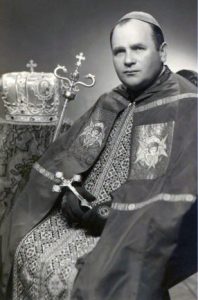 Basil or Vasiľ Hopko (April 24, 1904—July 23, 1976) was a priest and bishop of the Slovak Greek Catholic Church. He was beatified by Pope John Paul II for his martyrdom under Communist occupation.
Basil or Vasiľ Hopko (April 24, 1904—July 23, 1976) was a priest and bishop of the Slovak Greek Catholic Church. He was beatified by Pope John Paul II for his martyrdom under Communist occupation.
Hopko was born in the Rusyn village of Hrabské, Austria-Hungary in county Šariš, presently in eastern Slovakia. His parents, Basil and Anna née Petrenko, were landless peasants. While Hopko was still an infant, his father was struck by lightning and died. His mother left him in care of her father, while she emigrated to the United States in search of work. When Hopko was 7 he was sent to live with his uncle Demeter Petrenko, a Greek Catholic priest.
He attended the Evangelical gymnasium in Prešov, then Czechoslovakia, graduating with honors in 1923. Hopko studied at the Eparchial Seminary in Prešov. He had dreams of joining his mother in America, and of pursuing his priestly vocation there, but the cost of recurring health problems left him unable to afford to travel. He later wrote that when he finally decided to stay and to serve in his homeland, he was suddenly cured, and realized he had been given a sign about his calling. He was ordained a Greek Catholic priest on 3 February 1929.
He served as a parish priest (1929–1936) at the Greek Catholic parish in Prague, the Czechoslovak capital, where he was known for his focus on the poor, the unemployed, and students. His mother returned from the US after 22 years and rejoined her son in Prague, becoming his housekeeper at the parish rectory.
In 1936 he returned to teach in Prešov’s Eparchial Seminary, and was awarded the title of monsignor. He had already begun graduate studies at Charles University while in Prague, and he completed his Doctor of Theology in 1940 at Comenius University in Bratislava. In Prešov he headed the Eparchy’s publishing division, where he edited a monthly periodical.
After World War II, a growing Soviet Bolshevik influence caused Bishop Pavol Peter Gojdič of Prešov to ask the Vatican for an Auxiliary Bishop to help defend the Greek Catholic Church. Hopko was appointed to the post on 11 May 1947. The Communist take-over of Czechoslovakia wreaked havoc on the Greek Catholic Church. In 1950 it was officially abolished, and its assets were turned over to the Russian Orthodox Church. Gojdič was arrested and was imprisoned for life. Hopko was arrested on 28 April 1950 and kept on starvation rations and tortured for weeks. Eventually he was tried and sentenced to 15 years for the “subversive activity” of staying loyal to Rome. He was repeatedly transferred from prison to prison. His health, physical and emotional, failed, and in 1964 he was transferred to an old age home. He never recovered his health.
During the Prague Spring the Czechoslovak government legally cleared Hopko on 13 June 1968 and the Prešov Eparchy was restored. However, activists insisted that a Slovak bishop be appointed to the see, and the Vatican named the Slovak priest Ján Hirka as Hopko’s successor.
Hopko died at age 72 in 1976. On 14 September 2003 Pope John Paul II beatified him at a ceremony in Bratislava, Slovakia. (Source: JMT)
TROPARION–
Guide to orthodoxy, teacher of piety and holiness,
luminary for the world,
inspired adornment of bishops,
O wise Basil, harp of the Spirit,
you enlightened all by your teachings;
intercede with Christ our God to save our souls.
KONTAKION–
Divinely-wise Basil, you practiced self-control,
and stilled the desires of the flesh, O holy Father.
You flourished in faith and flowered like the tree of life in Paradise.
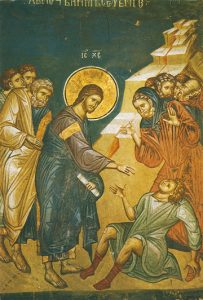 Read: 1 Corinthians 4:9-16; Matthew 17:14-23
Read: 1 Corinthians 4:9-16; Matthew 17:14-23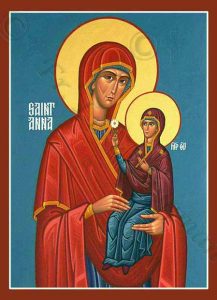
 Basil or Vasiľ Hopko (April 24, 1904—July 23, 1976) was a priest and bishop of the Slovak Greek Catholic Church. He was beatified by Pope John Paul II for his martyrdom under Communist occupation.
Basil or Vasiľ Hopko (April 24, 1904—July 23, 1976) was a priest and bishop of the Slovak Greek Catholic Church. He was beatified by Pope John Paul II for his martyrdom under Communist occupation.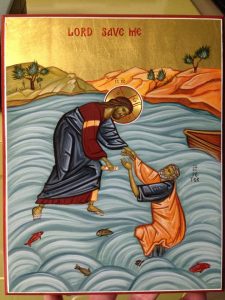 Read: 1 Corinthians 3:9-17; Matthew 14:22-34
Read: 1 Corinthians 3:9-17; Matthew 14:22-34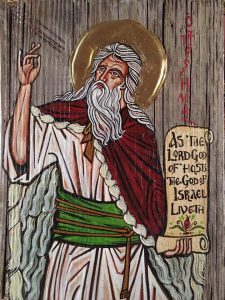 Today the Byzantine Church honors the memory of The Holy Great Prophet Elijah.
Today the Byzantine Church honors the memory of The Holy Great Prophet Elijah.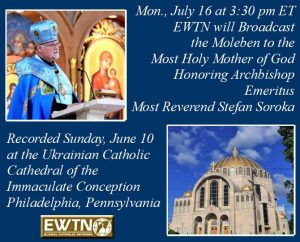
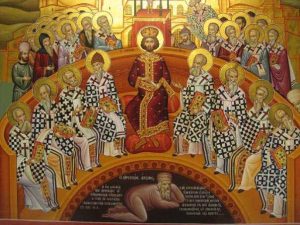 In addition to the observance of the 8th Sunday after Pentecost, the Church remembers the Father of the First 6 Ecumenical Councils. Moreover, the Church also liturgically recalls the memory of the Great Holy Prince, and Equal to the Apostles, Saint Vladimir.
In addition to the observance of the 8th Sunday after Pentecost, the Church remembers the Father of the First 6 Ecumenical Councils. Moreover, the Church also liturgically recalls the memory of the Great Holy Prince, and Equal to the Apostles, Saint Vladimir.